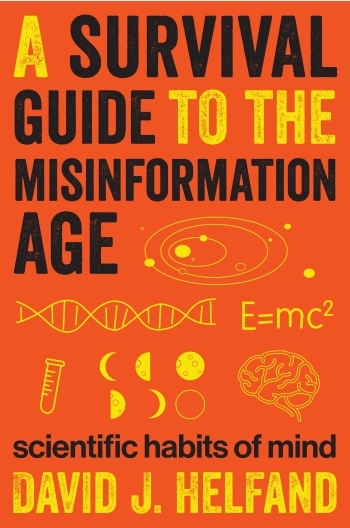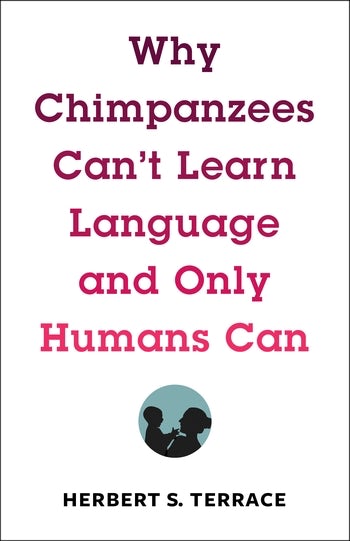An Interview with David J. Helfand, author of "A Survival Guide to the Misinformation Age"
The following is an interview with David J. Helfand, author of A Survival Guide to the Misinformation Age: Scientific Habits of Mind:
Question: Most people think we are living in the Information Age. Why the contrarian “Misinformation Age” in your title?
David J. Helfand: It is certainly true that the amount of information at our disposal is unprecedented, and the Internet democratizes access to this information in ways that are unique in human history. But we are now generating, worldwide, 2.5 quintillion bytes of data per day. If printed as standard characters, that represents the equivalent of 450,000 pages of text per person per day. Obviously, more than 99.99% of this “information” is not edited or vetted for accuracy. And the corollary of open access to the web for downloading information is that uploading information is equally unfiltered. The result? Unlimited opportunities for the propagation of misinformation, and unfettered access for individuals and organizations wishing to spread disinformation.
Q: Surely misinformation isn’t new, nor is the motivation of some to spread disinformation to advance vested interests. Why do you suppose the problem is greater today?
DJH: During the first 97% of the time members of the species homo sapiens have roamed the Earth, information was very limited but the important bits were generally of high quality. The member of the hunter-gatherer tribe who regularly led hunting parties toward the hungry lions instead of the zebras was quickly ignored (or eaten and eliminated from the gene pool; likewise with the one that gathered poisonous fruits). The sources of information—your clansmen—were unambiguous and there was an existential premium on good information.
Today the sources are anonymous, or at least often unknown to you, and their motivation for providing accurate information is negligible; there are no consequences for misinformation nearly as severe as the lions. Thus, if mis- or dis-information serves one’s purposes—either for accumulating money or power, or for the strong innate motivation of reinforcing group identity—there’s no barrier to broadcasting it. Couple this with the viral capacity of social media and the instant accessibility of nonsense for all, and you have what I think should rightly be called the Misinformation Age.
Q: Accepting your premise for the moment that misinformation is rife on the Internet, does it really matter? Are there any practical consequences of concern?
DJH: Indeed there are—dire consequences, both for making individual decisions about finances and health, and for the formation of rational pubic policy. I cite several examples in the book. Consider the “vaccination leads to autism” myth. The original study that led to this claim was unequivocally shown to be fraudulent (not just wrong, but generated in order to profit the principal author). The article reporting this result was retracted by the journal that published it and the author barred from practicing medicine; furthermore, many subsequent studies have shown absolutely no link between childhood vaccination and autism. Nonetheless, hundreds of websites exist to reinforce this bogus notion and large segments of the population believe it. In California, kindergartens exist in which fewer than 30% of the children attending have had their shots, because that state allows a “personal belief exemption” for parents who choose not to vaccinate their children. Between 2001 and 2010, there was an average of 45 cases of measles a year in the US, the large majority of which arrived from other countries. In 2011, the number was 220 cases and in 2014 it jumped to 667 cases, almost all among unvaccinated American children, with the largest number in California.
Or take climate change, if you aren’t concerned about sick and dying children. The Chairman of the Senate Committee on the Environment has labeled it a “hoax” and has brought snowballs into the Senate chamber to buttress his case. On this subject, there are thousands, if not tens of thousands of websites propagating misinformation, not to mention the thousands more that are designed to generate disinformation to protect financial interests. Just listening to the current political discourse on this topic should be enough to convince you it’s the Misinformation Age.
Q: Well, yes, that is a case where 97% of scientists agree, and hurricanes are getting stronger…
DJH: Ah, you see! You just added to the propagation of two totally bogus statistics.
In fact, the 97% figure comes from a 2013 article in Environmental Research Letters by Cook et al. Writing in The Skeptical Inquirer (Vol. 39, No. 6), J.L. Powell shows unequivocally that the methodology adopted by Cook et al. grossly underestimates the level of consensus. A complete review of all papers published in refereed journals in 2013 and 2014 that have titles or abstracts with the terms “global climate change” and/or “global warming”, shows that five out of 24,210 reject anthropogenic global warming (two of the five are by the same author, and only one of the five has a single citation, ignoring self-citations). Looking at all the authors of all those papers, four out of 69,406 or 0.0058% deny human-induced climate change. So the correct number is greater than 99.99% of scientists are part of the consensus, a qualitatively different statement than 97%.
As for hurricanes, you’ll have to read the details in the book, but in the last forty years, a period of unprecedentedly rapid warming, the number of Category 3-5 Atlantic hurricanes has decreased when compared with the previous 40 years. Just because there are a thousand websites that reiterate these statistics, and you hear these numbers constantly repeated by both social and traditional media, does not make them true. That’s the essence of the Misinformation Age.
Q: What is your proposed solution to this misinformation glut?
Read my book. The fast-changing, technology-dominated world we live in is not the world our brains evolved in. They are not, therefore, well adapted for carefully sifting through large quantities of often-abstract information, assessing it through skeptical questioning, and then combining it in useful ways that comport with reality. We do, however, have a processor, the prefrontal cortex, that is capable of such deliberate, rational decision-making. It just needs to have the right apps installed. That’s the point of my “Survival Guide”. As Neil deGrasse Tyson says in his review, such an approach is essential since “the future our civilization may depend on it.”







